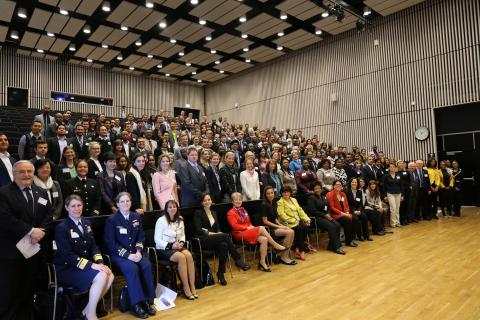Maritime Women: Global Leadership - An Unprecedented Event
2014-04-07
An unprecedented gathering of female maritime leaders from around the globe participated in the recent Maritime Women: Global Leadership International Conference (MWGL). Representing areas throughout the maritime sector, 265 women and men from 74 countries participated in the event to discuss the advancement of women in maritime professions. Hosted by the World Maritime University (WMU) from 31 March – 1 April, MWGL was delivered in cooperation with the International Maritime Organization (IMO) and built on the 2008 conference hosted by WMU that focused on empowering maritime women.
MWGL offered a two-day program with workshops focused on Employment, Policy, & Practice; Education for Career Building; Leadership, Mentoring & Networking; Sustainable Development in Shipping; and Promoting diversity with sessions focused on regional perspectives from the Americas, Europe, Asia, Arab States, and Africa. With a focus on research, and with male and female participants from so many regions around the globe, from so many areas of the maritime sector, MWGL was a particularly unique and powerful event.
In his welcoming remarks, WMU President, Dr. Björn Kjerfve, stated, “The old maritime world in which women could be ignored or marginalized has largely disappeared, it may still exist in some mindsets, but globally it is a thing of the past.” He noted that the sector has changed for the better with the involvement of women and that “an industry that carries 90% of the world’s goods needs at least 90% of the world’s talent…and gender is irrelevant.”
The numbers of women in maritime professions are increasing yet shipping remains a male-dominated industry. As the industry continues to grow, sustainability for shipping will logically be dependent on more women entering the maritime professions. HE Dr. Lina Shbeeb, Minister of Transport for the Hashemite Kingdom of Jordan, delivered the opening address in which she thanked WMU for bringing the participants together ”to discuss challenges and map out a path for cooperation between all parties who support the involvement of women in the maritime sector.”
Nancy Karigithu, Director General of the Kenya Maritime Authority Chaired the workshop focused on Employment, Policy, & Practice and reported that conclusions of the session suggested that in order to attract women to maritime careers and promote equality, formal strategies may be required to overcome challenges inhibiting women in the maritime sector. Such strategies could include reserving spaces for women in training programs as well as short and long term goals for gender equality with corresponding timetables to ensure progress. She further noted that, “differences between women and men are not challenges, they are talents that should be exploited and will add economic value to the workplace in the maritime sector.”
Further strategies suggested for equality in the workplace included offering continuing professional development programs for all individuals who require a break from the profession so they can maintain their skills at appropriate levels for workplace re-entry. In the case of female seafarers, it was recommended that there always be at least two onboard ship at any given time.
The strength of education, mentoring, and networking were recognized as key to the advancement of all individuals with participation in national and international associations highly recommended. Carla S. Limcaoco,President Women in Maritime Philippines and Director of PTC Management Corporation emphasized “It is important for women who enter the industry to persevere. There will be traditions to overcome and social stigma to deal with, but if they continue and receive the support from the network of a national women’s association they can succeed.”
In such a global profession, understanding of cultural differences was deemed invaluable and the importance of international exchanges for students and networking was emphasized. Claudia Grant, Deputy Director General of the Maritime Authority of Jamaica, maintained that events such as MWGL are not only important inspiration for women who have been working in the maritime sector to come together and build networks, they also "remind us that we have a responsibility to reach out to, and mentor young women in the maritime profession."
Overall, gender equality was emphasized for both women and men and there was an overarching understanding that suitability to maritime careers had less to do with gender, and more to do with an individual’s ability. Katharina Stanzel, Managing Director of INTERTANKO stated, “What we need to be aware of and honest about is that shipping is not for everybody. Whether they are male or female doesn’t really matter. It is a very special activity. Some parts of shipping require physical pain. They require people to be tired, wet, hungry, scared. It’s part of shipping. And there are women, just as men, who enjoy that challenge so let’s make it possible.”

